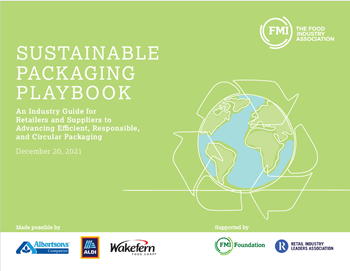The Need for Grocery to Focus on Sustainable Packaging
May 10, 2022
By Andy Harig, Vice President, Tax, Trade, Sustainability & Policy Development, FMI
 Just a few short years ago, most consumers viewed the plastic straw as a simple, colorful means for enjoying a beverage. However, this perception quickly changed for many once they saw the impact something as forgettable as a small plastic straw can have on sea turtles and other marine wildlife. The video of a turtle struggling to extrude a plastic straw trapped in its nose galvanized public opinion, spurring greater attention on the need for sustainable packaging solutions that meet the needs of consumers while also protecting the planet.
Just a few short years ago, most consumers viewed the plastic straw as a simple, colorful means for enjoying a beverage. However, this perception quickly changed for many once they saw the impact something as forgettable as a small plastic straw can have on sea turtles and other marine wildlife. The video of a turtle struggling to extrude a plastic straw trapped in its nose galvanized public opinion, spurring greater attention on the need for sustainable packaging solutions that meet the needs of consumers while also protecting the planet.
We live in a world reliant on plastics, which in many cases provide incredible value to consumers in terms of improved food quality and safety. Plastics can play an essential role in extending the shelf-life of food items. Unfortunately, despite their benefits to consumers, the U.S. Environmental Protection Agency notes that only 14% of plastic packaging can be recycled, resulting in plastic containers and packaging making up one-third of municipal waste. Beyond plastics, many other packaging materials are derived from tree fibers and metals like aluminum, steel and glass. Without significant investment and attention to finding more sustainable packaging solutions, we risk facing consequences from deforestation to excessive litter on our lands and sea.
Changing to Meet the Consumer Expectations
Customers are passionate about sustainability and expect industry to lead the way in developing more efficient, responsible, and circular packaging. To no real surprise, the 2020 U.S. Grocery Shopper Trends research identified Generation Z and Millennial consumers as being passionate about environmental sustainability. As time passes, these generations will become the majority consumers, using their purchasing power to signal their priorities on sustainability. Suppliers and retailers will need to proactively pursue packaging alternatives to maintain their competitive advantage with this cohort of shoppers. For this reason, over 250 businesses have signed environmentally friendly commitments, like The U.S. Plastic Pact to address plastic waste and pollution by 2025. The vision for this organization is to reduce the amount of plastic waste through a more circular economy and create a more sustainable world.
What is Sustainable Packaging?
Sustainable packaging is just as it sounds, packaging that is better for the environment intended to reduce the negative environmental impacts associated with the products we use every day to improve our lives. The recent FMI Sustainability in the Food Industry report indicates grocery shoppers have expressed a desire for recyclable, sustainable, and recycled packaging. However, the 2020 U.S. Grocery Shopper Trends research states six out of 10 consumers find identifying sustainable food choices difficult. The demand for these products exists, and in 2020, 53% of customers expressed a willingness to pay more for environmentally friendly foodservice packaging, according to The Power of Foodservice at Retail. Joining the challenge for sustainable packaging is not only positive for the environment but improves customer loyalty and spurs growth from innovation.
Three Common Packaging Focus Areas
As outlined in the 2021 FMI Sustainable Packaging Playbook, sustainable packaging comes down to focusing on three areas:
- Efficient design.
- Responsible sources.
- Circular systems.
Sustainability is fluid and constantly adapting to the world. Packaging must still adhere to FDA regulations, but there is an opportunity to explore design changes and alternative materials. Collaborating with suppliers can be highly beneficial for uncovering the best solutions to some of your supply problems.
Developing Your Grocery Operations Strategy for Sustainable Packaging
Sustainable packaging is a complex topic with many components. FMI developed the Sustainable Packaging Playbook, which includes topics ranging from material sourcing to design, to end-of-use, with a particular focus on recyclability. For each sustainable packaging topic, the playbook outlines a list of key actions to take and some next steps to consider as progress gets made. There's even a tool for evaluating if a packaging change has unintended consequences. The playbook includes a detailed guide to support improvement in circular systems for packaging by designing for recycling.
